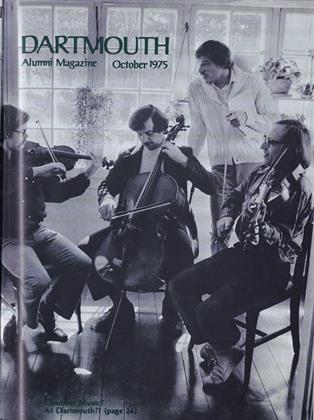Alexander Laing's Brant Point is a beautifully crafted piece of spiritual autobiography, a perceptive and articulate man's reading of what it has meant - and what it has cost - to be intellectually alive and emotionally sentient during the past 35 turbulent years.
Laing writes, as every poet must, out of his own unique sensibility. The wellsprings of his poems rise from personal experience, from his own joy and heartbreak, guilt and catharsis, memory and desire. Yet personal though they are, his poems are rarely private. For one thing, they are not incomprehensible, but rather thoroughly accessible to the careful reader. More important, as they strike against the reader's own experience and sensibility, sparks of recognition begin to ignite. The universal begins to take shape out of the particular, and the alchemy of poetry is achieved: Brant Point, we discover, is "about" us, all of us, not just the poet.
As with most poetry, its themes are unexceptional. Predictably, social injustice, political callousness, and moral neutrality sting Laing into some of his most trenchant verse. "Know-how" caustically questions the assumption of our industrial ethos that if it is technologically possible to do it, then it must be done. In "The Good Treason" the poet explores - and wittily subverts - those too easy definitions of "treason" and "un-American" bequeathed us from the McCarthy era. And in "Lines for an Inauguration/20 January 1973" he lashes the mindless American hubris implicit in the moon walk and Vietnam. In walking on the moon "It has pleased us to kill/Imagination," to make of Diana the Huntress merely "a cold cinder." Worse, "It has pleased us to make/Richard Nixon/in our own image/to reach round the bending earth/under the cold Moon/and send children running/Prettily aflame."
The most pervasive theme, however, is the generation gap, specifically the father-son relationship. One of five sections of the book is entirely devoted to this subject as the poet turns in imagination to the past and examines his paradoxical relationship with his long-dead father. Superficially the two seemed eternally hostile: "Son and father, like magnetic positives,/repellent in their similarity. ..." But deepened insight finally enabled the poet-son to make a kind of poet's peace: "I saw that my father's art was speech perfectible./Our truths were hostile, but our truth was one."
In the final section, Laing returns to the theme, but with the roles reversed. Now, a generation later, he has himself become the father, and his son in his turn tugs restively at invisible parental bonds. In the long, dense, final poem, "Brant Point," by skilful elaboration of a single central metaphor of sea and shore, the poet-father works through to a clear-eyed if paradoxical resolution as he envisions himself and his son at once both "near and lost," but nonetheless "held by one spidery cable —/love only,/ only love."
That the themes are the unexceptional stuff of our mundane 20th-century experience is in the end almost entirely irrelevant to the magnitude of Laing's poetic achievement. For it is what the poet does with those themes that makes Brant Point an exceptional book. The autobiographical poet practices a demanding art because the confessional mode inherently risks that ultimate downhill slide into the emotional self-indulgence of sentimentality. An insistent dwelling on the I-ness of I too easily betrays an unwary writer into a tone of bathetic self-pity. Alex Laing altogether escapes this pitfall, for he as had the wit - to say nothing of the skill - 0 create the needful aesthetic distance between himself and his subject matter. He does so by a finely controlled sense of ironic detachment. The "I" of the poem, his speaker, is not only a personal participant but a detached observer as well; he does not shout, he does not breast-beat, he does not exhort, he seldom even counsels. He presents. Consequently, the emotional intensity of the best poems rings true, and all the truer for being held taut on the leash of irony.
The ultimate success of Brant Point occurs precisely because of Laing's masterfully maintained tension between polarities, between the overwhelming pull of intense emotional experience on the one hand, but the perceived necessity for artistic, near-objective statement of the meaning of that experience on the other. Perhaps this is every poet's essential dilemma. If so, Alexander Laing solves it uncommonly well.
BRANT POINT. By Alexander Laing '25, Professor Emeritus of BellesLettres. University Press of NewEngland, 1975. 82 pp. Hard cover,$7.00; paperback, 53.50.
A retired English professor, Mr. Ross is theauthor of a literary history of modern poetryand editor of a critical anthology of poems.
 View Full Issue
View Full Issue
More From This Issue
-
 Feature
FeatureBefore the Revolution
October 1975 By ALBERT F. MONCURE JR., RONALD V. NEALE -
 Feature
FeatureA Dialogue for Autumn
October 1975 By COREY FORD -
 Feature
FeatureQuartet in Residence
October 1975 By DAVID WYKES -
 Feature
FeatureA MEMORANDUM
October 1975 By JAMES L. FARLEY '42 -
 Article
ArticleThe College
October 1975 -
 Article
ArticleThe Trolley Never Stopped Here
October 1975 By GEORGE W. HILTON
Books
-
 Books
BooksFACULTY PUBLICATIONS
May 1921 -
 Books
BooksAlbert W. Levi '32, is the author
December 1933 -
 Books
BooksA Differentiation of Tongues
APRIL 1978 By GEO. WINCHESTER STONE JR. '30 -
 Books
BooksTREATISE ON SURGICAL INFECTIONS
February 1949 By Rolf C. Syvertsen '18. -
 Books
BooksTHE COLLECTED POEMS OF DILYS LAING.
JANUARY 1968 By VERA VANCE -
 Books
BooksAMERICAN HIGHWAY PRACTICE,
April 1942 By William P. Kimball '28


